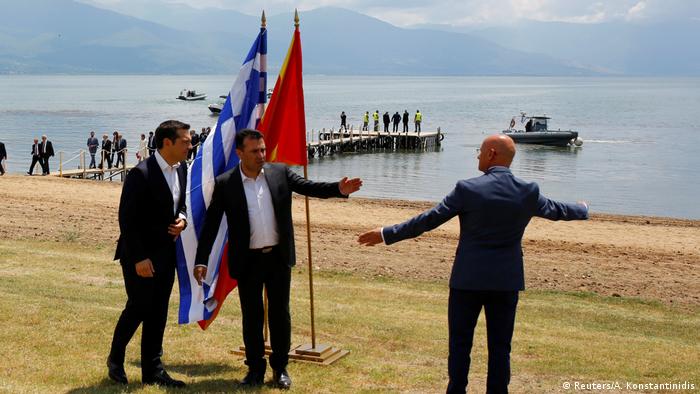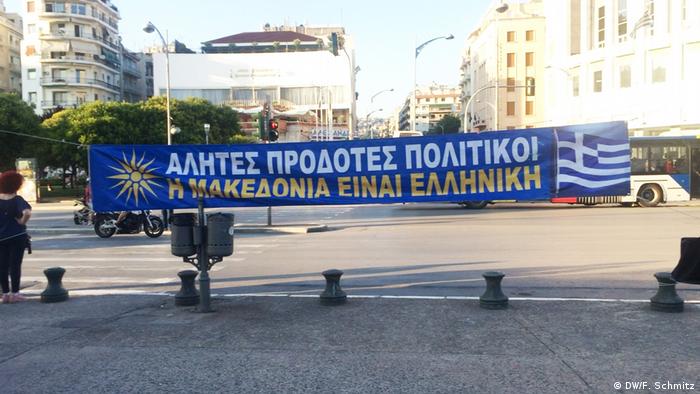Almost on a daily basis Greeks are demonstrating against the agreement in the name dispute with the neighboring country of Macedonia. Especially nationalists are outraged. Historians of the protests, see critical.

“Get out of here!”, yells at a black-clad, bald-headed man. In the Hand he holds the Greek flag. “Filming is forbidden”, said Another. “Why? This is legal,” I reply. “Because I say so.” The two belong to a gathering of about 200 nationalists, directly on the White tower, the landmark of Greece’s second largest city, Thessaloniki. Your concern: you are demonstrating against the agreement in the name dispute with the neighboring country of Macedonia. Journalists and critics are not welcome here.
With a little distance, have positioned some Kamerteams the Greek media. “We do not want to provoke,” explains a reporter. “These couple of people fall. This has nothing to do with how one thinks in Thessaloniki.” In fact, few of the passers-by notice of the meeting. “Macedonia is Greek and orthodox!” is written on the banners.

Vemund Aarbakke followed the developments of the Macedonian question since the 1980s
According to current polls, about 63 percent of Greeks support this stance. They are against the agreement, which was signed four weeks ago in Northern Greece Prespes between Prime Minister Alexis Tsipras and his Macedonian counterpart Zoran Zaev. Especially the Ultra-right and over-zealous Orthodox Christians feel that the policy betrayed.
Patriotism instead of confrontation
Long Greek nationalists were no longer as active as it is today. A few weeks ago, a group of violent protesters and right-wing stormed a Left popular Café in the centre of Thessaloniki. The visitors got away with bruises and the shock. The Jewish memorials for the victims of the Holocaust at the freedom square and the University campus were desecrated. The Norwegian Vemund Aarbakke can shake only the head. He teaches and conducts research for the past 15 years, at the history Institute of the Aristotle University of Thessaloniki. His area of expertise: the poltisiche history of the Balkans.
The protests in his Greek home-of-choice vote him sad: “All this aggression, this hatred and this fear that you would steal our story – what’s the point?” For Aarbakke, there is a lack of social engagement with the Mazedeonien question, especially on a: historical facts. He thinks little of, to seek the answers to the problems of today in ancient times. “If you ask me as a historian, whether Alexander was Greek or Macedonian, then I say that he belongs to a different time.” The strong identification with ancient heroes, he finds strange. “I’m Norwegian. But when I think about the Viking’s speech, then I do not speak of ‘We.’ This is much to long.”

“Politicians are crooks and traitors. Macedonia is Greek!” – Banner of right-wing protesters on an Anti-Macedonian rally in Thessaloniki
In Greece we react especially emotionally. “It is a specifically Greek kind, the current Situation of a national self-understanding to adapt,” he criticizes. Also the education plays a Central role. “Many students are shocked when they read for the first Time, scientific texts on the subject and find that what you have learned in school, is very different.” It is only since the 1990s, there was a critical examination of the founding years of the country and the civil war. But it is precisely this epoch is crucial for what is referred to today as Macedonia.
Hardly any dialogue in the Balkans
Greece’s Ultra-right and its aggressive propaganda against the Northern neighbours are just the tip of the iceberg. The national attitudes that permeate all classes of society in a country that had, in the hard years of crisis, much was taking a beating. That’s why many people talk about shame, especially in the North of Greece, especially of Dropi, to German, and not, for example, of steps in a stable, shared future or economic benefits for both sides. Counter-demonstrations or political rallies of supporters of the agreement of Prespes? .

Rights of protesters defacing the Holocaust memorial in Thessaloniki (Copyright: Eleni Hodolidou)
Not only in Greece but also in the neighbouring countries, the political rapprochement processes are rather of a silent majority supports. To the public just a Few to commit to a neighborhood-oriented foreign policy and of the common history of the car. To difficult cultural demarcation of weighing processes in a Region, the national borders only in the late 19th century. Century, played a role. That Alexis Tsipras in his address in Prespes, Greece as part of the Balkans: a taboo.
History as an approximation
Zvezdana Kovac, Director of the Thessaloniki based centre for democracy and reconciliation in Southeast Europe (CDRSEE) welcomes the agreement reached between Greece and Macedonia. For the Montenegro-born journalist, this is a historical act. Since about 20 years the Institute supported and motivated cultural rapprochement processes in the Region. Especially the historical education play a crucial role. “In all the countries of the Balkans, such as in Greece, the approach to history, above all, ego – and ethno-centered. They glorified their own country and blamed the neighbors. We motivate the perspective of the Other.”

Political rallies against the agreement reached in the name dispute to be supported mainly from the right edge and of the Church
The role of the West you have a rating of critical. Europe had wars in the Region, according to the Yugoslavia received little attention, emphasizes Kovac. “You forget: The Balkan is part of Europe. If democratic processes are in danger here, it could have dire Konsequzenen for the entire continent.”
For Vemund Aarbakke, the Resistors of a rapprochement are buried, especially in the consistent Negation of the common past. We have to recognize that the Region of cultural diversity was characterized. “In Greece, the Dogma, there is often a the country is more homogeneous than other countries in Europe. The course is not so. It is a question of dealing with the reality and otherness. Who, like some of the propagated here, cultural purity, which creates especially of: problems.”

